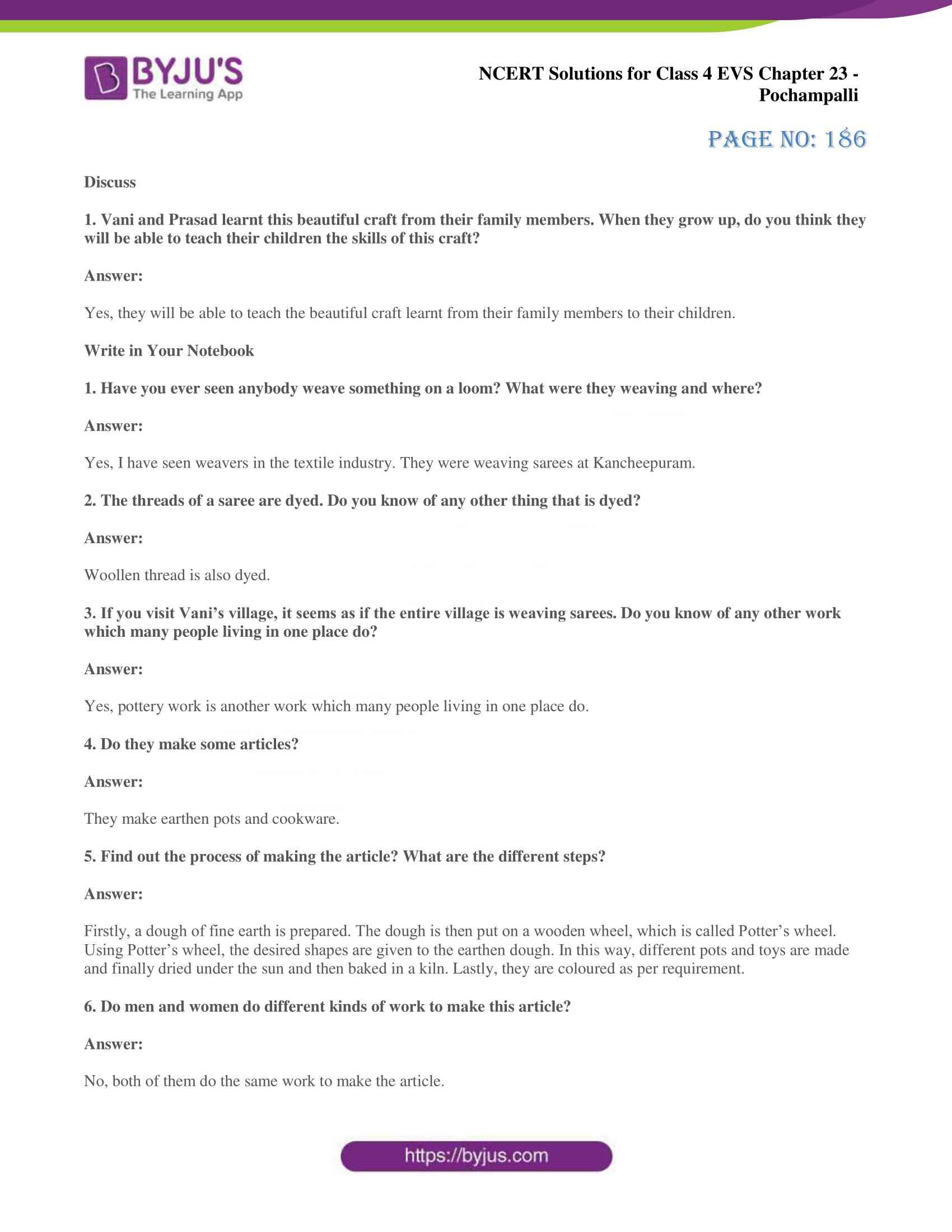NCERT Solutions Class 4 EVS Chapter 23 – Pochampalli is an interesting topic which explains the arts, crafts, and different materials used in the manufacturing of Pochampalli dress materials. Students can download the NCERT Solutions in PDF from the links below and prepare well for the annual examination.
NCERT Solutions Class 4 EVS Chapter 23 – Pochampalli
Access to NCERT Solutions Class 4 EVS Chapter 23 Pochampalli
Page No: 186
Discuss
1. Vani and Prasad learnt this beautiful craft from their family members. When they grow up, do you think they will be able to teach their children the skills of this craft?
Answer:
Yes, they will be able to teach the beautiful craft learnt from their family members to their children.
Write in Your Notebook
1. Have you ever seen anybody weave something on a loom? What were they weaving and where?
Answer:
Yes, I have seen weavers in the textile industry. They were weaving sarees at Kancheepuram.
2. The threads of a saree are dyed. Do you know of any other thing that is dyed?
Answer:
Woollen thread is also dyed.
3. If you visit Vani’s village, it seems as if the entire village is weaving sarees. Do you know of any other work which many people living in one place do?
Answer:
Yes, pottery work is another work which many people living in one place do.
4. Do they make some articles?
Answer:
They make earthen pots and cookware.
5. Find out the process of making the article? What are the different steps?
Answer:
Firstly, a dough of fine earth is prepared. The dough is then put on a wooden wheel, which is called Potter’s wheel. Using Potter’s wheel, the desired shapes are given to the earthen dough. In this way, different pots and toys are made and finally dried under the sun and then baked in a kiln. Lastly, they are coloured as per requirement.
6. Do men and women do different kinds of work to make this article?
Answer:
No, both of them do the same work to make the article.
7. Do children also contribute to making this article?
Answer:
Yes, children also contribute to making the articles.
Find out and Write
1. Talk to an ironsmith, a carpenter and a potter about the nature of their work.
Answer:
Ironsmith – makes things made of iron
Carpenter – makes wooden articles
Potter – makes earthen pots and toys
2. Where did they learn to do their work?
Answer:
Usually, they learn it from parents and family members.
3. What else did they need to learn to be able to do this work?
Answer:
They need to be creative and artistic and have a great imagination to be able to do this work.
4. Have they taught this work to anybody in their family or to anyone else?
Answer:
Yes, they teach this work to their family members and to anyone who is interested in learning it.
5. The table below has a list of different kinds of work that people do. Do you know people who do such work? Write their names in the first column. In the next column, write from whom they have learnt their work.
| Kind of Work | Name of People Who Do This Work | Where Did They Learn This Work from? |
| Cloth weaving | Prasad and Vani’s parents | From their elders |
| Cooking | ||
| Cycle repair | ||
| Flying aeroplanes | ||
| Sewing and embroidery | ||
| Singing | ||
| Making shoes | ||
| Flying kites | ||
| Farming | ||
| Cutting hair |
Answer:
| Kind of Work | Name of People Who Do This Work | Where Did They Learn This Work from? |
| Cloth weaving | Prasad and Vani’s parents | From their elders |
| Cooking | Martin Paul | In a Hotel Management Institute |
| Cycle repair | Raju and Das | From their elders |
| Flying aeroplanes | Sai Preetham | In a flying school |
| Sewing and embroidery | Sushmitha | From his mother |
| Singing | Yuvan Shankar Raja | From his father |
| Making shoes | Naveen and Adil | Institute in Fashion Technology |
| Flying kites | Brithul | From his elder cousin |
| Farming | Ganesh and Ramesh | From their elders |
| Cutting hair | Rudra and Balaji | From his father |




Comments